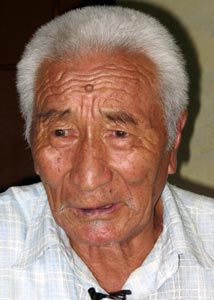Name: Tsering
(Alias: Yes)
Gender: Male
Interview Age: 85
Date of Birth: 1922
Birthplace: Thoe Gay-jar, Utsang, Tibet
Year Left Tibet: 1961
Profession: Nomad, Salt Trade
Monk/Nun: No
Political Prisoner: Yes

Interview No.: 79
Date: 2007-07-06
Language: Tibetan
Location: Dickey Larsoe Settlement, Bylakuppe, Karnataka, India
Categories: Culture and History
Keywords: Chinese -- first appearance of, Chinese rule -- life under, Chushi Gangdrug guerrillas, escape experiences, nomadic life, refugee in India -- life as, salt trade, trade, Utsang
Summary:
Tsering is a nomad from the Thoe Ngari region in Utsang. He become a salt-trader at the age of fifteen and Tsering describes step-by-step how Tibetans gathered salt and took it to Ladakh, where they traded it for barley, rice and wheat. From start to finish, the process of salt trading--including removing salt from the lakes, filling the saddle bags, loading them on the yaks and sheep, traveling to Ladakh, and returning home--took the traders around two months.
Tsering then explains how the salt trade came to an end when the Chinese suddenly barred Tibetan salt traders from traveling to Ladakh. With their livelihoods threatened and with no means to challenge the Chinese on their own, all of Tsering's fellow villagers left to join the Chushi Gangdrug Volunteer Force in Dhoporang. The journey took several days and before the villagers could reach Dhoporang, Chinese soldiers intercepted and captured around 300 of them, including Tsering. Some villagers were arrested and the remainder, after months of indoctrination by the Chinese, were sent back to their village.
Interview Team:
- Marcella Adamski (Interviewer)
- Tsering Dorjee (Interpreter)
- Tsewang Dorjee (Videographer)

